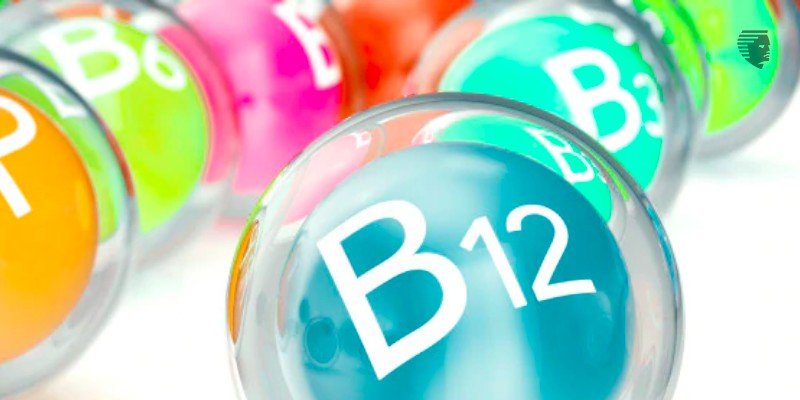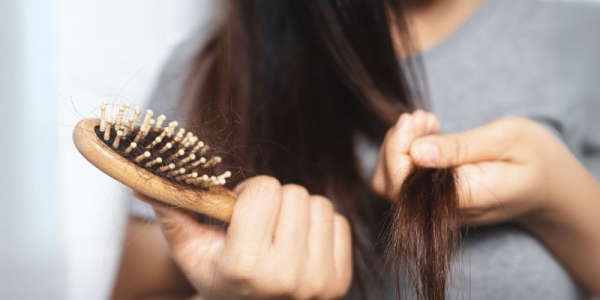Can Deficiency of Vitamin B12 Lead to Hair Loss?

28 May 2022

Hair Experts @ AHS

Vitamin B12 is an important vitamin needed by our bodies. It helps in DNA and red blood cell formation. Vitamin B12 deficiency is directly linked to hair growth as the red blood cells it makes carry oxygen to the hair follicles. In many cases, when one is wondering what causes hair loss, it is Vitamin B12, as when its level drops, the hair follicles become weak and unable to support new hair growth. This results in excessive hair thinning and shedding.
Vitamin B12 is an important vitamin needed by our bodies. It helps in DNA and red blood cell formation. Vitamin B12 deficiency is directly linked to hair growth as the red blood cells it makes carry oxygen to the hair follicles. In many cases, when one is wondering what causes hair loss, it is Vitamin B12, as when its level drops, the hair follicles become weak and unable to support new hair growth. This results in excessive hair thinning and shedding.
How is the Growth of Your Hair and B12 Connected?
The deficiency of Vitamin B12 can cause several health issues, the most common ones are — depression, anxiety, anaemia and hair loss. In addition to directly causing hair loss, Vitamin B12 can trigger other diseases as well that can further fasten hair loss. How?
Because anaemia, too, has been associated with hair fall. As lack of Vitamin B12 can cause several mental issues like depression and anxiety, it becomes difficult to focus on holistic health. This leads to hair loss as well.
How is the Growth of Your Hair and B12 Connected?
The deficiency of Vitamin B12 can cause several health issues, the most common ones are — depression, anxiety, anaemia and hair loss. In addition to directly causing hair loss, Vitamin B12 can trigger other diseases as well that can further fasten hair loss. How?
Because anaemia, too, has been associated with hair fall. As lack of Vitamin B12 can cause several mental issues like depression and anxiety, it becomes difficult to focus on holistic health. This leads to hair loss as well.
What are the Sources of Vitamin B12?
Many foods include vitamin B12, which we may not be aware of. Getting enough vitamin B12 does not need a radical overhaul of your eating habits. Regular consumption of the following Vitamin B12 sources will be enough:
- Milk Vitamin B12 is added to many dairy and non-dairy products. While making a purchase, check the nutrition label to see the percentage or weightage of vitamin B12.
- Cereals Cereal is a good source of vitamin B12 if you are a vegan or vegetarian. Choose a cereal with little added sugar and high fibre and grain content.
- Eggs Egg yolk contains more vitamin B12 than egg white. Eat the entire egg if you want to enhance your vitamin B12 consumption. Consult your doctor or a dietician first if you have high cholesterol.
- Yoghurt Vitamin B12 is readily absorbed in dairy products; hence eating full-fat plain yoghurt has been found to treat vitamin B12 insufficiency. Fat-free Greek yoghurt is a better choice if you want to save calories while still getting enough vitamin B12 to keep you healthy (it even has more vitamin B12 than the whole yoghurt).
- Salmon Many people prefer eating salmon over other fishes. Omega-3 fatty acids, protein and B vitamins are found in abundance in this food.
- Red Meat 3 ounces of red meat once or twice a week is ideal. Choosing leaner meats, which contain greater quantities of vitamins, is a good option.

Intake of B12 Supplement for Hair Loss
You can find different forms of Vitamin B in the market. Manufacturer, dose and method of administration all differ.
Tablets, capsules and pills are the most frequent ways to get your daily dose of vitamin B12. There is no need for medical supervision or a prescription for these over-the-counter medications administered orally. As a reminder, not all vitamin B12 products absorb immediately into the blood. The supplement loses some of its potency during digestion.
Hair fall treatment may be helped by vitamin B12 administration. There will be no changes to the cycle of hair growth you are used to. Supplementing vitamin B12 will not result in hair growth within a few days or even weeks. Depending on where it is in the hair cycle, it might take up to 4 months for a strand of hair on your head to emerge on the scalp. Vitamin B12 is a long-term approach to hair development. To enhance the proliferation of your cells, you need to take a supplement or get an injection every day.
What Health Problems Occur Due to Deficiency of Vitamin B12?
This vitamin is readily available to the majority of people. You may need to be tested for vitamin B12 levels if you're unsure. This vitamin might be tougher to absorb as we get older. If you've undergone weight reduction surgery or another treatment that removes part of your stomach or if you drink excessively, you may also be at risk of developing GERD.
Vitamin B12 insufficiency can lead to:
- The inner lining of the stomach or strophic gastritis deteriorates
- Diseases of the small intestine, such as Crohn's, celiac, bacterial proliferation and parasite infestation
- Having a swollen, irritated tongue
- Diseases related to the immune system like Lupus
What Can You Do to Prevent Hair Loss?
Treatments and natural cures are available in the pharmacy and at home.
Some forms of hair loss can be treated at home; however, this isn't always the case. Discuss with the doctor before deciding on any of these alternatives.
- Massage the Scalp: Scalp massage is one of the simplest and least expensive ways to attempt to thicken your hair. However, you need to ensure that it is done properly otherwise it can lead to breakage.
Using your hands, apply gentle pressure on your scalp as you shampoo your hair to stimulate blood flow. A portable massager for the scalp may help eliminate dead skin cells and provide even more advantages. - Aromatic Oils: Aromatherapy and other forms of complementary medicine extensively use essential oils and concentrated liquid extracts of certain plants.
In certain cases, lavender oil can help those suffering from male pattern baldness. Rosemary and thyme oils, for example, are often blended with lavender oil.
the oil. If you notice redness or other discomfort, hives or a rash, you may be suffering from Diluting an essential oil is important to avoid skin irritation if you decide to use this therapy. Observe for 24 hours to see whether any response occurs after applying a little quantity of an allergic response. - Ant-Hair-Thinning Shampoo: In addition to preventing hair loss, anti-thinning shampoo has two more benefits. They give your hair more volume, giving the impression that it is thicker. People with hair thinning or fine hair may benefit from this.
Vitamins and amino acids are also included in shampoos for thinning hair or hair loss. The greatest results may be obtained by following the exactly product directions. - Vitamin and Mineral Supplements: To maintain healthy hair, you must maintain a healthy diet and exercise routine. New hair may not grow from follicles in malnourished people or who have eating problems. A vitamin shortage may be detected with a blood test.
A daily multivitamin, such as B12, may be recommended by your doctor if you are deficient in many essential nutrients. Iron, Zinc and folic acid are essential for healthy hair growth. Both men and women should look for daily vitamins that match these requirements.
However, if you're currently receiving all the nutrients you need, you shouldn't take more vitamins. This does not seem to reverse thinning hair and may potentially cause more damage than good, and this is not backed by any scientific data. - Supplements of Folic Acid: Folic acid, a B vitamin, is essential for producing new cells in the body. According to research, a lack of folate may be linked to some forms of hair loss.
However, there isn't enough proof that folic acid will help you grow thicker hair, much as with multivitamins. - Biotin: Biotin, or vitamin B-7, is a water-soluble component that may be found in nuts, lentils and liver, among other foods.
Biotin deficiency is unlikely if you consume a well-balanced diet. The popularity of biotin supplements has risen in recent years because of the claims that these supplements can increase energy and improve hair development. Hair thinning may be improved with biotin, which helps break down enzymes in the body.
Taking biotin with vitamin B-5 tablets is a bad idea. Each of them may lessen the other's effectiveness if they are combined. - Omega-3 and Omega-6 Fatty Acids: Essential fatty acids like omega-3 and omega-6. Why? Because humans are incapable of producing them. Anti-inflammatory omega-3 fatty acids, commonly found in fish oil, may help alleviate a wide range of ailments. Inflammation may also play a role in premature hair loss.
Omega-6, on the other hand, is critical for healthy skin and may have a positive impact on the hair's health. Fish and certain seeds are the principal sources of omega-3 fatty acids, whereas plant-base d oils provide omega-6 fatty acids. Assuming you don't regularly eat these kinds of foods, you may want to discuss the possibility of supplementation with your physician.
What is the Recommended Dosage of Vitamin B12, and how much is too much?
Your age affects the quantity of vitamin B12 dosage for hair loss you need to take daily. 2.4 mcg of vitamin B12 daily is recommended for 14 and older. Pregnant or breastfeeding women should consume an extra 2.6 or 2.8 mcg of iron daily.
Even though taking more vitamin B12 than the recommended daily dose does not seem to be harmful, a study found that pregnant women with greater B12 levels had a higher chance of their kids developing an autism spectrum disorder (ASD).
Conclusion
Vitamin B12 is essential for your body as it is responsible for making red blood cells that carry oxygen to other parts of our bodies and DNA. Its deficiency can cause several issues, including hair loss. Suppose you are experiencing hair loss along with mood swings, weakness, anxiety or other symptoms linked with B12 deficiency. If this is your case, you should consult a physician and take Vitamin B12 dosage for hair loss per their recommendation.
In some cases, reversing hair loss caused due to Vitamin B12 deficiency might be impossible. Here, a proper hair loss treatment is the only solution. To start your hair fall treatment journey, get in touch with hair experts at Advanced Hair Studio.
Stay Updated
Subscribe to our email newsletter for helpful tips and valuable resourses
Be an influencer
Join forces with Advanced Hair Studio! Explore exciting collaboration opportunities tailored for influencers. Let's redefine haircare together.
Connect now





